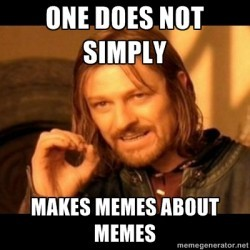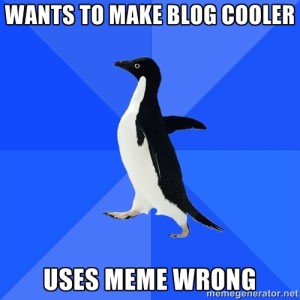Memes are everywhere. They’re funny and catch the attention of potential customers online. But are memes appropriate for use in social media marketing? How do you draw the line between using humor and being unprofessional?
There is in fact a type of advertising called memetic marketing, which utilizes trends online to get internet users’ attention and show that the company is aware and involved in what’s trending online. But let’s start with the basics, as apparently choosing from several
social media posting tools is easier than deciding whether you should use memes.
The history of memes
Memes (rhymes with “seems”) are internet trends that gain traction by being shared, often with variations on the same idea or image. The word itself comes from the Latin word, mimeme, which means “imitated thing.” The history of the word can be found in an interesting infographic here.
The most common use of the word “meme,” however, refers to pictures with personally generated text that describe a relatable situation or a type of emotion – although this term can also refer to videos and other trending online media.
There are tons of different types of memes, but some of the most popular ones can be found here.
These types of memes can be found on Tumblr, Facebook, and Twitter most commonly and are usually meant to be funny, relatable, and reflect what is trending at the moment. But when is it appropriate to use these for your own professional blog? Check the answers from Sponsoredlinx Internet Marketing
What memetic marketing can do for your brand
While you can have a very successful blog without using memes, there definitely are some benefits of using them that might bring more potential clients to your site, or convince them to stay and look around once they’re there. What do memes add to your blog or social media?
- They make you seem aware of the market and demographic. Your potential customers feel like you understand them when you post things they relate to.
- You can show your personal sense of humor and the brand’s personality.
- Humor is a great selling point – just look at some of the more memorable commercials.
- An interesting, multidimensional blog interests readers and encourages them to forward your site to others.
- They give you an easy way to have a variety of quick posts that are funny and have visual interest.
So you might be convinced that memes are good things to use now and then – but you might be asking yourself, “How?”

While this is a cute meme, the awkward wording from line to line is an example of how memes can go wrong.
How to use memes for social media marketing
When deciding whether to use a meme, there are a few things you should consider.
- What is the tone of your blog or brand overall?
- What kind of personality does your company/brand have?
- Who is your demographic?
- How professional or casual do you want your brand to seem?
- Are you comfortable with swears or racey jokes?
While we recommend you think carefully about these questions before deciding on using any meme, you shouldn’t let fear of seeming unprofessional stop you from adding personality and humor to your outreach. You should try to find memes that are not inappropriate and will resonate with your target audiences without sacrificing professionalism. It’s important to keep your tone formal enough so that your readers take you seriously, but you don’t want to seem stiff, or they might be less interested in your brand.
If you have an idea for a meme that will relate well with your client base, you can make your own customizable one at websites like this. All you have to do is find the template you want and type in the top text and the bottom text. Look carefully at the examples of the ones that are already made, because a poorly written meme can turn people off. A meme done well, however, can greatly improve your online marketing, encourage your readers to stay on your site, keep looking through your posts, and share it with their friends.
[social_share style=”circle” align=”horizontal” heading_align=”inline” text=”Learn how to use memes on your site” heading=”Inishgtful? Share with your followers!” facebook=”1″ twitter=”1″ google_plus=”1″ linkedin=”1″ pinterest=”1″ /]
What’s your favorite meme? Do you use them on your blog or social channels? Let us know what you think in the comment section below!


Speak Your Mind